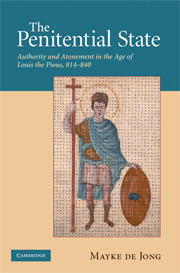Epitaph for an Era
Politics and Rhetoric in the Carolingian World
$30.99 (C)
- Author: Mayke de Jong, Universiteit Utrecht, The Netherlands
- Date Published: May 2020
- availability: Available
- format: Paperback
- isbn: 9781108813884
$
30.99
(C)
Paperback
Other available formats:
Hardback, eBook
Looking for an examination copy?
If you are interested in the title for your course we can consider offering an examination copy. To register your interest please contact collegesales@cambridge.org providing details of the course you are teaching.
-
Wala, abbot of Corbie, played a major role in the rebellions against Emperor Louis the Pious, especially in 830, for which he was exiled. Radbert defended his beloved abbot, known to his monks as Arsenius, against accusations of infidelity in an 'epitaph' (funeral oration), composed as a two-book conversation between himself and other monks of Corbie. Whereas the restrained first book of Radbert's Epitaphium Arsenii was written not long after Wala's death in 836, the polemical second book was added some twenty years later. This outspoken sequel covers the early 830s, yet it mostly addresses the political issues of the 850s, as well as Radbert's personal predicament. In Epitaph for an Era, an absorbing study of this fascinating text, Mayke de Jong examines the context of the Epitaphium's two books, the use of hindsight as a rhetorical strategy, and the articulation of notions of the public good in the mid-ninth century.
Read more- Challenges the divide between political and literary history
- Offers an in-depth analysis of the literary representations of the text as well as the political consequences, to appeal across disciplines
- Explains complex issues such as rhetorical theory and Latin political vocabulary in a way that is accessible to historians and non-specialists alike
Reviews & endorsements
‘A lively and compelling interpretation of the tumultuous central decades of the ninth century from the vantage point of a single text, the Epitaphium Arsenii, and through the eyes of its fascinating but neglected author, Paschasius Radbertus.’ Thomas F. X. Noble, University of Notre Dame, Indiana
See more reviews‘Paschasius Radbertus, one of the most learned figures of the ninth century, applied all of his skills as biblical exegete, rhetorician and political insider to rehabilitate not only the shifting political career of Charlemagne's cousin and his own abbot patron Wala, but his own as well. The resulting text, his Epitaphium Arsenii, was so carefully crafted and directed towards such a small and elite audience at the centre of the Carolingian world that only a scholar as gifted as Mayke de Jong could possibly penetrate the multiple layers of this extraordinary text. Her Epitaph for an Era brilliantly illuminates not only Radbertus's dialogue, but the turbulent reign of Louis the Pious and the dissolution of the Carolingian empire.’ Patrick J. Geary, Institute for Advanced Study, New Jersey
'Mayke de Jong’s book combines readability with profound learning. She proffers an insider’s feel for what until recently were understudied fields. Ranging 'between the cloister and court', she probes deep into the cultures of both. As classical rhetoric jostles with dialogues, the past arcane becomes today’s relevant.' Janet L. Nelson, King’s College London
'A model of close textual analysis, de Jong’s study brilliantly elucidates Carolingian political history as both lived and later mourned by Radbertus of Corbie … Highly recommended.' G. I. Halfond, Choice
‘It is therefore a stroke of luck that Mayke de Jong, the historian who corrected the negative image of Ludwig the Pious in a groundbreaking biography, is now also presenting a monograph on the Epitaph of Paschasius Radbertus … with the same empathy with which she made the actions of Ludwig the Pious understandable against the background of the challenges of his time, she now devotes herself to the most important written justification from the camp of his opponents.’ Karl Ubl, Historische Zeitschrift
‘Epitaph for an Era brings us the perspective of an empire’s stakeholders … her book should appeal as much to historians of religion as to those of politics and provides a model for those wishing to combine both with in-depth literary analysis.’ Robert Evans, The Journal of Ecclesiastical History
‘De Jong’s Epitaph for an Era brings Radbert’s rich and understudied literary art fully into the current scholarly conversation, and we are very much the better for it. The book contributes enormously to ongoing debates that will be of interest to any medievalist-debates about Carolingian identity, the transformations of the late antique world, and the birth of ‘medieval’ European ideologies. Paired with its companion translation it promises to contribute even more.’ Andrew Romig, Early Medieval Europe
‘De Jong synthesises political and literary analysis in exemplary fashion, showing how Radbert adopted and adapted principles of rhetoric in his defence of Wala and, by extension, himself.’ Edward Roberts, The English Historical Review
‘In Epitaph for an Era, Mayke de Jong, who has published extensively on the Carolingian world, provides an exemplary study of the Epitaphium Arsenii and its author. De Jong shows that the Epitaphium is not only a fascinating text in its own right, it is in many ways emblematic of an era and its way of thinking.’ Maya Maskarinec, Speculum
‘… the book … presents a remarkably sympathetic portrait …’ Maya Maskarinec, Speculum: A Journal of Medieval Studies
Customer reviews
Not yet reviewed
Be the first to review
Review was not posted due to profanity
×Product details
- Date Published: May 2020
- format: Paperback
- isbn: 9781108813884
- length: 284 pages
- dimensions: 150 x 230 x 20 mm
- weight: 0.43kg
- contains: 1 map 4 tables
- availability: Available
Table of Contents
1. Introduction
Part I. History:
2. Interconnected lives
3. Between the cloister and the court
Part II. Rhetoric:
4. Lament and dialogue
5. Strategies of persuasion
6. What's in a name?
Part III. Politics:
7. Radbert and the rebellions
8. For God, King and country
9. The world they had lost
Conclusion.
Sorry, this resource is locked
Please register or sign in to request access. If you are having problems accessing these resources please email lecturers@cambridge.org
Register Sign in» Proceed
You are now leaving the Cambridge University Press website. Your eBook purchase and download will be completed by our partner www.ebooks.com. Please see the permission section of the www.ebooks.com catalogue page for details of the print & copy limits on our eBooks.
Continue ×Are you sure you want to delete your account?
This cannot be undone.
Thank you for your feedback which will help us improve our service.
If you requested a response, we will make sure to get back to you shortly.
×
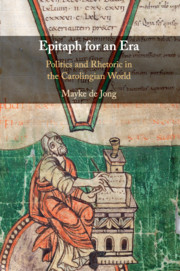
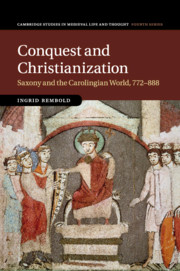
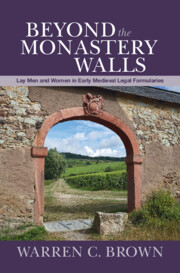
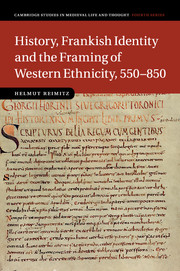
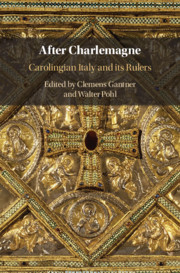
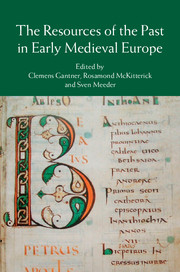



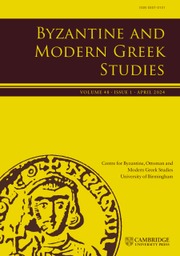
.jpg)
.jpg)

